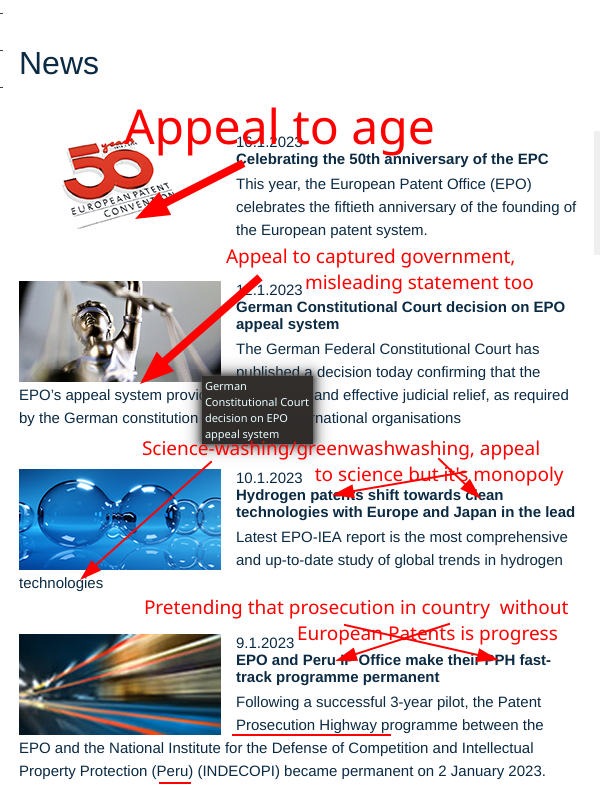
AS we noted here some weeks ago, the German Constitutional Court was intentionally not ruling on complaints regarding the EPO, quite likely for political/corporate reasons. We've already seen under both Benoît Battistelli and António Campinos that the German government protects EPO management no matter how many crimes it commits. 4 years ago there was also concern about Stephan Harbarth, who demonstrated commercial and political interference inside the German Constitutional Court. Here's what the EPO rushed to publish some days ago. It was very, very short. It said:
The German Federal Constitutional Court has published a decision today confirming that the EPO’s appeal system provides independent and effective judicial relief, as required by the German constitution for courts of international organisations.
"The German government harbours one heck of a "patent mafia" at this point."Anyway, this shows that Germany's constitutional court, the FCC, isn't functioning either. It's captured by corporate interests. Just shills in robes?
As one German explained in our IRC channel this morning: "the mine that Luetzerath is being demolished for, also expanded over another village 30 years ago and that one was demolished because the German government bows to corporate interests."
Looking elsewhere in the "news" page of the EPO, there are other types of propaganda so far this year. Here's the gist as an annotated screenshot:

EPO workers can hopefully relate to the stupidity of those statements. This is the poor management of the EPO showing the best it has got. Yes, Peru. Nothing wrong with Peru per se, but to the EPO it is irrelevant.
Incidentally, the decision from the FCC was mentioned (before and after) in the comments SUEPO links to at the top of the page, SUEPO.org. To quote:
Concerned observer JANUARY 10, 2023 AT 2:02 PM “It is unfortunate that the EPO seems to prefer silence to transparency when it comes to what’s happening at the organization”.
Well, that is putting it mildly. On the occasion in question, silence served the purpose of the EPO avoiding answering (or even commenting upon) the question of whether the President had indeed used foul language at the GCC meeting. However, it seems that there are other occasions where the EPO is happy to comment, albeit by providing reports that everyone outside of the EPO’s management struggles to reconcile with their understanding (or recollection) of events.
So why does the EPO make such deliberate attempts to evade scrutiny and/or to paint a misleading picture? Apart from the obvious reason (namely, that it suits the management’s agenda to do so), the sad truth is because they can. Frankly, concepts such as transparency, proper regulatory oversight and even the rule of law mean very little to an international organisation that has decided to set its face against such things.
Concerned observer JANUARY 11, 2023 AT 4:49 PM I await with interest to lean what the German Constitutional Court (BVerfG) makes of the complaints relating to the EPO. The cases in question have been pending before the BVerfG for periods ranging from about 6 to about 12 years. However, it seems that the BVerfG is FINALLY ready to publish its decisions (on 12 January): https://www.bundesverfassungsgericht.de/DE/Presse/Senatsbeschl%C3%BCsse/Senatsbeschl%C3%BCsse_node.html
Whilst I am not a gambler, I would wager that the BVerfG’s decisions will essentially conclude that there is nothing to see here … most likely on the basis of (alleged) insufficient substantiation of the legal grounds raised in the complaints.
In any event, the German government will of course already know the outcome of the complaints. Given that there have been no signs of frantic diplomatic efforts to patch up defects in the EPC, I think that it is safe to conclude that the BVerfG’s decisions will not force Germany to withdraw from that Convention. Thus, for me, the only point of interest in the decisions will be the extent to which it (plausibly) argues that the current set-up of the Boards of Appeal is acceptable. My guess is that the BVerfG’s reasoning on this point, if any, will be about as convincing as the Dutch Supreme Court’s argument that access to the ILO-AT serves as an adequate guarantee of the right of EPO staff to COLLECTIVE bargaining.
Misma JANUARY 12, 2023 AT 11:49 AM In any doubt about compliance of the EPO boards of appeal with ECHR 6.1 ‘independent tribunal’, i would encourage the complainants to escalate to the ECHR.
Germany has a tradition to protect the EPO.
Concerned observer JANUARY 13, 2023 AT 7:12 PM The ECtHR also has a tradition to protect (other) international organisations.
Concerned observer JANUARY 12, 2023 AT 1:31 PM Spooky! It is almost as if I have a crystal ball: https://www.bundesverfassungsgericht.de/SharedDocs/Entscheidungen/DE/2022/11/rs20221108_2bvr248010.html
Whilst there is still a lot for me to digest in the decision, a particularly noteworthy point is that the complaint filed by a UK legal entity was deemed inadmissible, but only because the BVerG did not issue their decision prior to Brexit. As Brexit happened nearly 7 years after the relevant complaint was filed, this result seems more than a little harsh on the UK-based complainant!
If I understand the decision correctly, it also seems to conclude that LEGAL entities based outside of the EU are not entitled to protections provided by Germany’s Basic Law … INCLUDING the protection that is supposed to guarantee equality before the law. No doubt there is much more to this than meets the eye. However, it does seem to be a curious conclusion, especially if one considers its potential implications (eg with respect to enforcement of rights guaranteed under the ECHR).